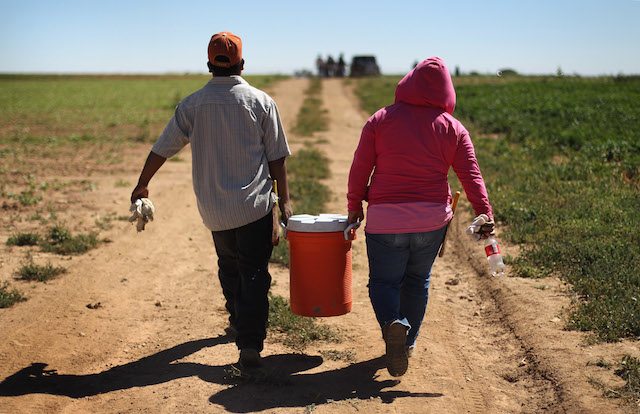Over the past few weeks, we’ve witnessed the shock and awe of President Trump’s aggresive executive orders on border security ("Build that wall!") and interior immigration enforcement (ramping up ICE raids, reviving 287(g), not even bothering to pay lip service to reserving deportation for undocumented people convicted of violent crimes). During the second week of February, law enforcement arrested over 600 people at homes, roadside checkpoints, their regularly scheduled ICE check-ins, and even outside of a church hypothermia shelter. And of course aggressive enforcement creates a daily risk for people working while undocumented.
According to the Brookings Institution, immigrants comprised only 13 percent of the population in 2010, but made up 16.4 percent of the total labor force. The Pew Research Institute finds that in arming and construction, undocumented workers outnumber those with legal status.
Organized labor leaders from the Labor Council for Latin American Advancement, A. Philip Randolph Institute, Asian Pacific American Labor Alliance, Coalition of Black Trade Unionists, Coalition of Labor Union Women, Pride At Work and the Metropolitan Washington Council of the AFL-CIO, have deemed the executive orders as anti-worker in nature. And the tech sector has been quite vocal in critiquing Trump’s January executive order that bars people from seven Muslim-majority countries from entering the United States and suspends the refugee admissions program. The story is more complicated in the two industries that rely most heavily on unauthorized immigrant labor—agriculture and construction.
{{image:2}}
Agriculture
According to the American Farm Bureau Federation (AFBF), the nation’s largest farm lobbying group, about 50 to 70 percent of people working U.S. farms are undocumented immigrants. That heavy dependence has made the sector particularly concerned with immigration policy. In a 2014 report, the AFBF, which represents nearly 6 million member families, concluded that an "enforcement-only" approach to immigration [PDF] would be "detrimental" to the agriculture industry. The report also found that a mass deportation approach like the one Trump is using now could lead to a 3 to 6 percent increase in food prices over five years and a loss of $60 billion in revenue annually.
The sector has mostly expressed its concern in terms of the higher food prices and production costs and labor shortages in fruit and vegetable harvesting, jobs that the AFBF and other groups insist American-born and citizen workers won’t do. Policywise, the group has advocated for a major overhaul of the H-2A guest-worker visa program.
But, many farmers and growers are also concerned about the xenophobic tone of the rhetoric and policies of the new Administration. As Roger Johnson, president of the National Farmers Union, told Politico, "all this conversation that can be generally seen as anti-immigrant is not helpful." The president of the AFBP, Zippy Duvall, recently spoke about the "need to talk about adjusting the status for the experienced workers who have been here for 20 years." And at a February ag-tech conference in Menlo Park, California, Bruce Taylor, CEO of Taylor Farms, said about President Trump: “I’m not sure he likes our labor force. … It puts a sense of urgency on the industry and the industry’s partners to solve the problem…” Farmworker Justice, a national advocacy organization, have also condemned the executive orders for “instilling fear in many farmworkers and their families.”
These concerns of the farm industry indicate the trouble with conflating farmers with rural Americans, who are more likely to be Trump supporters. Farmers, especially those who rely on immigrant labor, may have differing views from non-farming communities in rural America about the efficacy of immigration policies that emphasize enforcement.
Construction
A January 2015 study by the National Association of Home Builders notes that immigrant laborers comprise 23 percent of the American construction labor force. Undocumented workers make up a growing segment of that population. According to a February 2013 report by the Workers Defense Project and the University of Texas, over 1 million of the nearly 7 million construction workers in the United States are undocumented. The sector has not been publicly criticizing the executive orders although CEOs of some companies emphasized the importance of immigrant labor in the wake of the presidential campaign. Douglas Yearley of Toll Brothers Inc. was quoted in Bloomberg Technology as saying: “Our business is an immigrant-based business. You go on a construction site of any homebuilder and it is the United Nations. I’ve been in this business 26 years and I don’t think I’ve ever met a Caucasian trowel hanger. It’s just the nature of the business.”
Still, it is likely that the sector will benefit from efforts to build a wall along the southern border and the construction of the Keystone XL and the Dakota Access pipelines, according to Construction Dive, an industry news source. Brian Turmail, senior executive director of public affairs for the Associated General Contractors of America, notes that many construction firms will be interested in bidding on “any new physical barrier along the U.S. Mexico border."
As additional executive orders loom ahead on the admission of temporary workers and the use of public benefits, the industries that rely on immigrant labor could influence public opinion and policy shifts if they amplify the economic and human rights costs of enforcement-only approaches to their workers.
